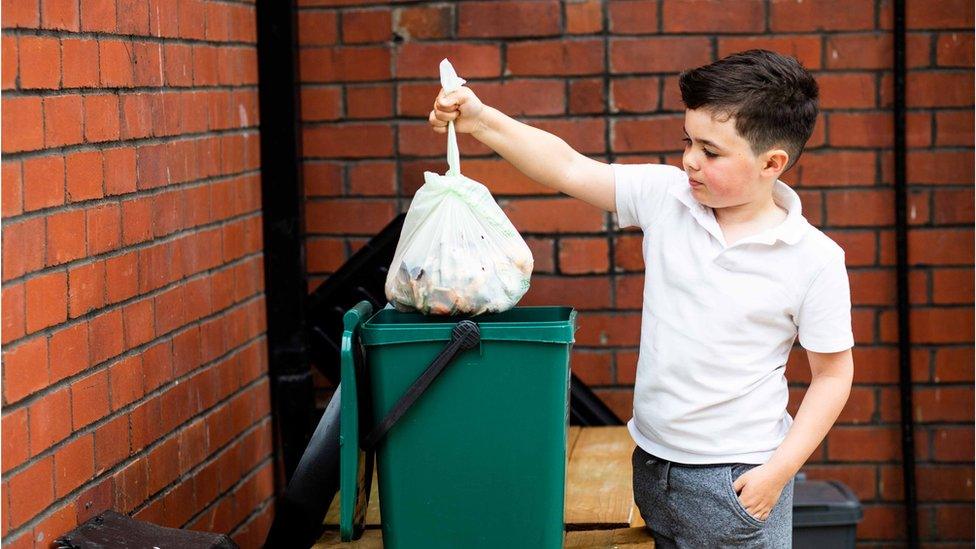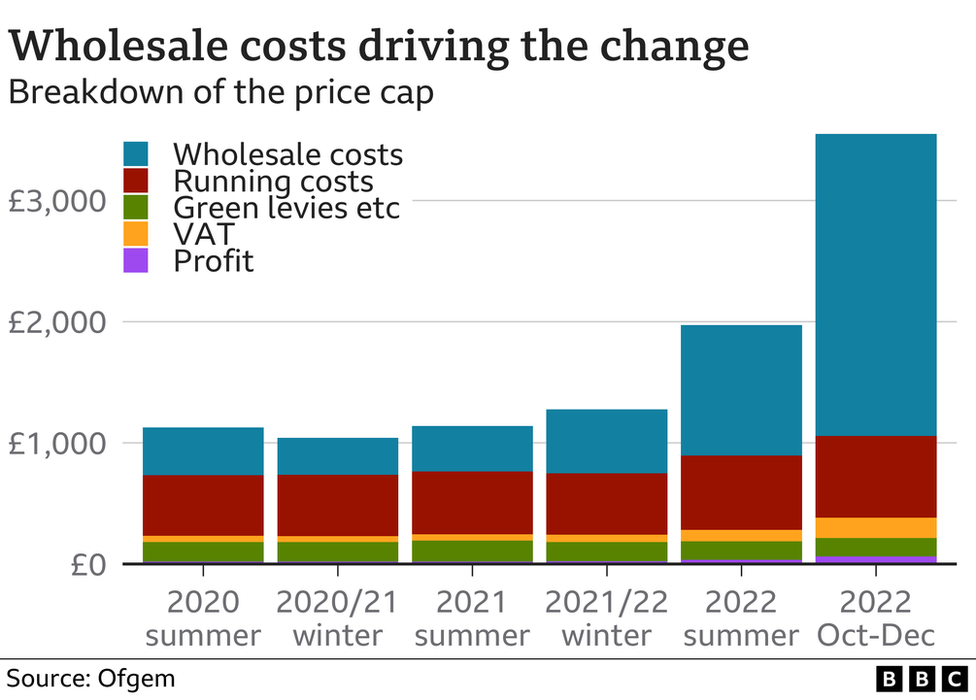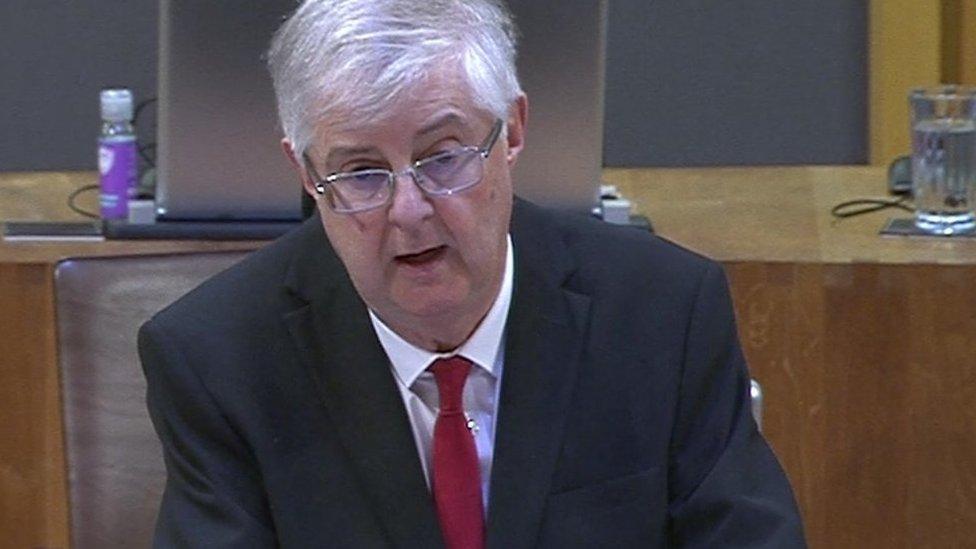Cost of living: Leisure centres in Wales could close as costs treble
- Published

Swimming pools across the UK are struggling with rising energy costs
Gyms and swimming pools in Wales could be forced to close as energy bills soar, a leisure centre owner has warned.
Freedom Leisure said the cost of running swimming pools at 19 of its Welsh centres had risen from £8m a year to £24m.
It comes as some councils warned of potential cuts to libraries and leisure centres amid huge budget pressures.
The Welsh government urged the UK government to act.
The UK government said local government was devolved and was the Welsh government's responsibility, but it had given Welsh ministers a "record £18bn per year".
The Welsh Local Government Association (WLGA) said councils were facing pressures "on a scale never seen", with significant cuts ahead unless more support was given.
Andrew Morgan, who is also leader of Rhondda Cynon Taf council, said: "We have lots of services that have been cut over the years, [we have] lost things like leisure centres, libraries, we can't close them a second time, and unless something changes, there will be really difficult choices.
"The public are going to see some real upset...we will see job losses, reductions in services, and a scaling back in what local authorities can do."
Ivan Horsfall Turner, chief executive of Freedom Leisure, who run 29 sites in Wales, told BBC Radio Wales Breakfast the company had already had to close one centre in England due to rising costs.
"I think it's quite plausible that there will be an element of facility rationalisation or in other words, some facilities closing in order to keep others open," he said, adding the latest bill estimate included the energy price cap.
He said the not-for profit organisation had agreed support from Wrexham council and was in talks with Powys and Swansea councils to keep leisure centres open.

Councils are in charge of essential services including collecting waste and recycling
"We've got some 19 pools in Wales and the cost of running them for the next 12 months... will be some £3.3m more than they were last year so that's the scale of the increase [per swimming pool].
"Across the portfolio, that increase will be from £8m in utility costs to some £24m worth of costs and that's even with the government cap in place," said Mr Horsfall Turner.
He said customers are being charged up to 10% more for using leisure centre services.
But added that increase "doesn't get close" to covering costs, "when your costs increase by 300% in terms of utilities... particularly with inflation and the staffing costs".
He added he wanted to see leisure recognised as a vulnerable sector when a UK government review of its Energy Bill Relief Scheme goes through in January to ensure there would more support from April next year.
"Public leisure centres are intensive users of utilities are so important to their local communities," he added.
'Significant cuts'
All councils across Wales are affected by rising costs, and inflation.
They are bound by a legal obligation to fund statutory services such as education, social care and waste collection, which raises concerns about other services such as leisure centres.
Rhondda Cynon Taf council leader Andrew Morgan said latest figures for next year showed energy costs for the council would increase by £14m - from a £6m gas and electricity bill to £20m.
Mr Morgan, who is also leader of the WLGA, said councils had never faced "anything on the scale of next year", even during austerity.
"To put that in context, if every household in Rhondda Cynon Taf, if every household in RCT paid £130 extra on their council tax, that would only cover the gas and electric next year. Our overall budget gap is £46m pounds next year because of pay, inflation, all the other things hitting us, so we are facing significant cuts," he said.

Carmarthenshire council cabinet member for resources, Alun Lenny said: "The council is £100m worse off than they were 10 years ago due to year upon year cuts following austerity.
"Every year it gets more difficult, but as someone said, this year it is like austerity on steroids."
"This is unprecedented in my experience.
"This authority alone is looking at cuts of anywhere between £8m and £22m. This has come upon us due to factors beyond our control."
When it comes to where the axe will fall, Mr Lenny said that they were "looking already right across the board".
He added: "We don't want to lose services. I know some councils may be considering getting rid of leisure services, which are non-statutory.
"Ultimately we must defend education and social care. Those are the core services."

There are fears about the impact of rising costs on schools
Council leader at Vale of Glamorgan council, Lis Burnett said: "The big question for us is how we protect those vital services that protect our most vulnerable and how we find different ways of doing things so that we can maintain the others."
She would not be drawn on possible cuts and closures.
'We are down to the bone'
"At this point I am staying away from talking about closures, we are still number crunching. We're about £28m short."
She added they would consult on their cost-cutting proposals once they had gone through their figures and cuts would also need to be planned over a period of up to 10 years.
"It feels worse this year, we are down to the bone, we have got staff going above and beyond through the pandemic and now we are asking them to do more.
"We are trying to work when when we are on shifting sands a lot of the time, there is such a lot of uncertainty coming down from Westminster.
"This is the kind of stuff that keeps you awake in the middle of the night."

Freedom Leisure runs 29 centres in Wales, including one in Wrexham
Welsh councils receive most of their funding from the Welsh government, which in turn is funded by the UK government.
The Welsh government said: "Our budget is worth £4bn less over this three-year spending period because of rising inflation.
"This UK government has starved public services of funding.
"The finance ministers in Wales, Scotland and Northern Ireland have written to the chancellor to call on him to change course immediately.
"It must reverse its disastrous mini-budget and deliver a meaningful package of support."
In response, HM Treasury said: "We are committed to growing the economy across the UK through our growth plan, which will allow us to properly fund and invest in our vital public services.
"The responsibility for funding public services is largely devolved across the UK, but we have provided the Welsh government with a record £18 billion per year."

THE TUCKERS: They might not always be on the right side of the law, but who's telling?
DABBERS AT THE READY: A glimpse into life at a Tonypandy bingo hall

- Published11 October 2022

- Published25 September 2022
